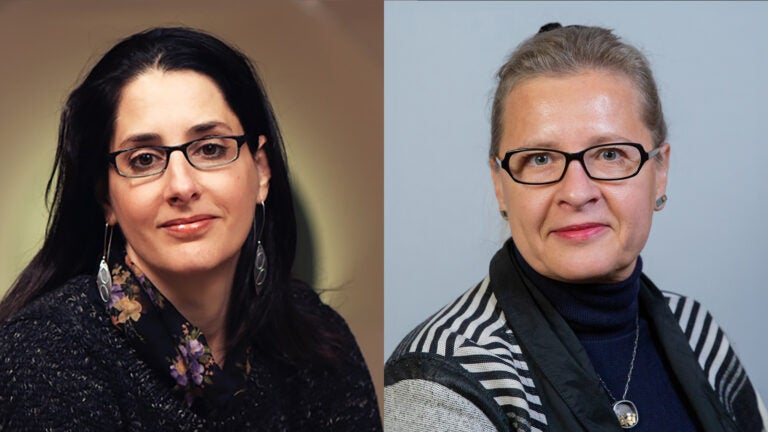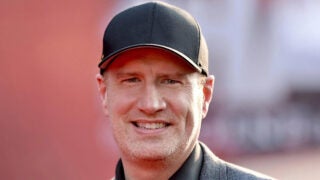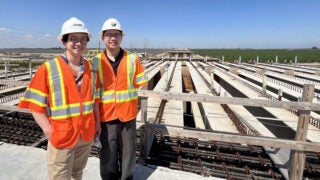
Mary Helen Immordino-Yang, left, and Anna Krylov are in the academy’s 2025 class, which includes novelist Amy Tan, cancer geneticist Kenneth Offit and actor Danny Glover. (Photos, left to right/Courtesy of USC Rossier; Mike Glier)
2 USC faculty members elected to the American Academy of Arts & Sciences
Mary Helen Immordino-Yang and Anna Krylov are among the select number of scholars, artists, humanitarians and policymakers honored for their outsize contributions to the world of ideas.
USC faculty members Mary Helen Immordino-Yang and Anna Krylov have been elected to the American Academy of Arts & Sciences.
Founded in 1780 by more than 60 “scholar-patriots” including John Hancock and John Adams, the academy honors intellectual excellence and fosters interdisciplinary collaboration.
The academy’s charter is to “cultivate every art and science which may tend to advance the interest, honor, dignity, and happiness of a free, independent, and virtuous people.”
Immordino-Yang and Krylov join a distinguished company of notable honorees. The academy’s earlier members include Benjamin Franklin, Alexander Hamilton and George Washington; other distinguished members have included Madeleine Albright, Martha Graham, the Rev. Martin Luther King Jr., Margaret Mead, Georgia O’Keeffe and Colin Powell.
This year’s inductees also include novelist Amy Tan, cancer geneticist Kenneth Offit and actor Danny Glover.
Mary Helen Immordino-Yang
Immordino-Yang is a professor of education, psychology and neuroscience and founding director of USC’s Center for Affective Neuroscience, Development, Learning and Education.
“Being elected to the academy is a humbling and deeply meaningful honor,” Immordino-Yang said. “It affirms the importance of using science to elevate how we think about learning and development — not just as cognitive tasks, but as profoundly emotional, social and cultural processes. I am grateful to my colleagues, students and the communities we partner with for shaping and advancing this work together.”
Internationally recognized for her pioneering research at the intersection of neuroscience, human development and education, Immordino-Yang has made groundbreaking contributions to understanding how emotion, social experience and culture shape brain development and learning. Her work has informed education policy, curriculum and teacher preparation around the globe.
Immordino-Yang is investigating how adolescents make meaning of their world — known as “transcendent thinking” — and examining how secondary teachers support and nurture this type of developmental learning.
“Mary Helen’s election to the academy is a powerful acknowledgment of the impact her work is having on how we educate young people. She is helping to transform our understanding of what adolescents need to learn deeply and thrive fully, and how schools and systems must evolve to meet those needs,” said Dean Pedro Noguera of the USC Rossier School of Education, in which Immordino-Yang is a professor of education and holds the Fahmy and Donna Attallah Chair in Humanistic Psychology. She is also a professor of psychology and neuroscience at the USC Dornsife College of Letters, Arts and Sciences and a faculty member in the USC Brain and Creativity Institute.
Learn more on the USC Rossier website.
Anna Krylov
Krylov is the USC Associates Chair in Natural Sciences and a professor of chemistry at USC Dornsife. Her research spans various fields, including bioimaging, solar energy, quantum information science and spectroscopy. Her induction into the academy highlights exceptional contributions to theoretical and computational chemistry, specifically in understanding molecular behavior at the quantum level.
At USC Dornsife, she leads the iOpenShell lab, where her team develops computational methods to study molecules, particularly those that are electronically excited or contain unpaired electrons, known as radicals. Radicals are crucial in many chemical and biological processes, including combustion, solar energy conversion and DNA repair.
Her research continues to advance science. “In the past decade, we have been working on a formidable problem — developing a unified theoretical framework for bound and unbound electrons,” Krylov said. Bound electrons are held within atoms or molecules, while unbound electrons have enough energy to exist freely.
“We have developed many-body methods for states on the continuum (electronic resonances), which we now apply to important phenomena. And, we are at the verge of introducing new tools for treating free electrons with high accuracy.”
Krylov’s interest in chemistry arose from her early fascination with “flames and explosions,” she said: “When I realized that you can make a really big bang with a proper mix of chemicals — that was it for me.”
In addition to the induction into the academy, Krylov has received numerous awards throughout her career, including the Barry Prize, the Earle K. Plyler Prize for Molecular Spectroscopy & Dynamics and the Friedrich Wilhelm Bessel Research Award. She is an elected member of the American Academy of Sciences and Letters, Academia Europaea and International Academy of Quantum Molecular Science.
Learn more on the USC Dornsife website.



